31 October 2025 - World Cities Day Public Emergency Service Workers: Rising to Every Storm Takes Courage - and Decent Work

This World Cities Day, PSI honours the courage and dedication of firefighters, paramedics, emergency responders, municipal employees, park rangers, utility workers, and countless others who risk their lives daily to keep our cities and communities safe. Yet, too often, Public Emergency Service workers face inadequate access to fundamental labour rights and decent working conditions.

Daria Cibrario
When hurricanes, floods, landslides, earthquakes, wildfires, eruptions or tsunamis strike, most people run for safety. Public Emergency Service (PES) workers, instead, run towards danger and sometimes death — driven by duty to save lives, protect communities, safeguard the environment, and preserve vital public and private infrastructure. As climate change intensifies and increases the frequency of extreme weather events; as new and re-emerging epidemics arise; and while conflicts, and human-made disasters including industrial accidents and terrorist attacks multiply, the work of PES workers has never been more critical to protecting people, public health, and life on the planet.
On this UN World Cities Day 2025, PSI has chosen to celebrate the dedication and sacrifice of Public emergency workers and shares the message: “Rising to every storm takes courage — and decent work”. PSI calls on the UN, mayors, local and regional governments as well as national government to engage in dialogue and cooperation with PES workers’ unions to address the serious human and labour rights deficits as well as the chronic understaffing, that many PES workers face worldwide. It is high time to ensure decent work, adequate workforce levels, resources, training, working tools and safe, protective gears for those who stand on the frontlines of every crisis to save us all.
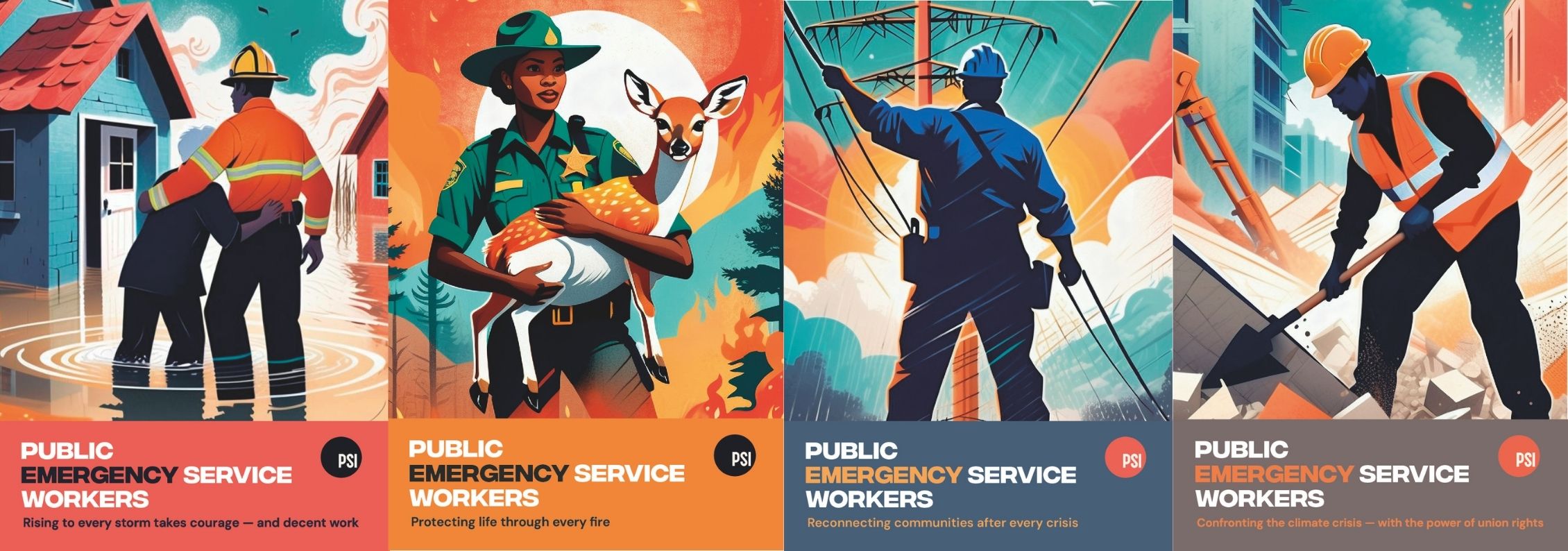
Download our posters
Under Art. 10 of the 2018 Guidelines on decent work in public emergency services, the International Labour Organization (ILO) defines Public Emergency Services as “police, firefighting, emergency medical services, search, rescue and evacuation services, and other services regularly called upon to respond in emergencies, such as health and social services, armed forces, security and surveillance services, bomb disposal units, local governments, mortuary and body-handling services, immediately necessary measures which are critical to allow rescue and stabilization, services responsible for the restoration of water and electricity supply, and related professions, such as social workers, according to need and national context”. Yet many more workers are on the frontlines of the multiple crises the world is facing. A majority of these workers fall under the jurisdiction of local and regional governments (LRGs).
The series of testimonies and pictures that follow were provided by PSI affiliates from Dominica, Turkey, Honduras, Argentina, Chad and Spain. They showcase the courage, solidarity, and the daily realities of PES workers from around the world serving on the frontlines of disasters.
PES workers in the Caribbean and small island developing states (SIDS): bearing the brunt of the climate crisis
PES workers are the ones who keep others safe, calm, and cared for — even as they risk their own lives.
The critical work carried out by PES and LRG workers across the Caribbean is widely recognized. They stand on the frontlines of disaster preparedness, response, and recovery — leading efforts to protect lives and rebuild communities in the face of crises intensified by climate change. These disasters and pandemics inflict immense damage, loss, and hardship on communities and small island developing states (SIDS) throughout the Caribbean, which remain on the receiving end of the world’s worsening climate impacts, a crisis they did not create. SIDS in the Caribbean like Dominica, Antigua & Barbuda, Grenada, and Jamaica, St. Maarten and Anguilla, and others know all too well what a category five hurricane leaves behind. The people on these islands live with this reality; as they experience these impacts all too often.
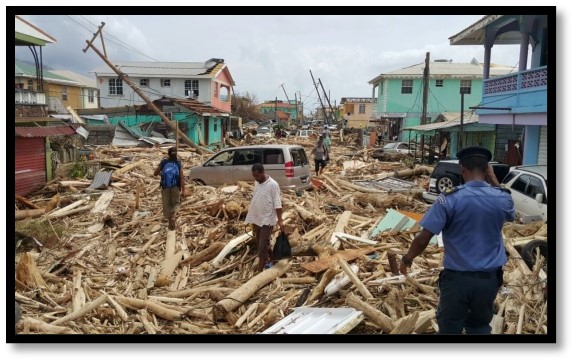
“PES workers are the ones who keep others safe, calm, and cared for — even as they risk their own lives. They treat the injured, search for the missing, and recover the dead. They evacuate the elderly and people with disabilities, build and operate emergency shelters, and ensure access to food, water, sanitation and healthcare when homes and services are destroyed” says Steve Joseph, President of the Dominica Public Service Union (DPSU). “Yet too many of them remain invisible, are denied the recognition and the decent working conditions they are entitled to. Some even fall on duty serving their communities and helping their colleagues”.
Steve recalls the remarkable courage and dedication of the Search and Rescue teams composed of Fire and Police Officers, which on 27 August 2015 led and coordinated the evacuation of the entire community of Petit Savanne (Dominica) in the immediate aftermath of Tropical Storm Erika. They worked hand in hand with local leaders, staff, and members of the Village Council and Community Disaster Committee. Within just 48 hours, a preliminary assessment of the damage was completed, enabling the Prime Minister of Dominica to declare nine Special Disaster Areas on 29 August 2015.
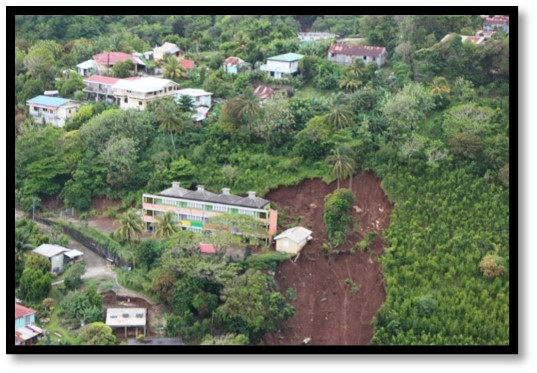
As a result, around 600 people could be evacuated from Petit Savanne, while residents from several other affected communities were relocated to emergency shelters. Reports from the National Emergency Operations Centre (NEOC) of Dominica indicated 574 homeless people, and eight shelters were opened to house approximately 200 displaced residents. Families faced immense hardship: many were unable to contact their loved ones or recover the bodies of the missing to give them a proper burial. In those darkest hours, PES workers were their only lifeline.

Among those was Steve’s colleague, Andrew Darroux, who dedicated his entire career to serving communities as a local government worker. On the day of the passage of Erika, he was swept away by a massive landslide — his body was never recovered. At 7 a.m., he was already at work, assisting neighbours and assessing storm damage, unaware of the danger that still laid ahead. Andrew was one of thirty victims that day, seventeen of whom were never found. In the aftermath, firefighters, police officers, sanitation workers, health professionals, water and energy workers, and local council employees left their own families behind to search for the missing, assess the damage, care for survivors, and bring relief to devastated communities.
Their courage, professionalism, and dedication were extraordinary. “We honour and salute all workers who provide emergency and local public services in the darkest hours — and we pay tribute to their humanity, their service, and their sacrifice” Steve Joseph adds. “These disasters leave lasting scars on our people and communities. Trade unions and their partners must use every means at their disposal to demand greater investment in quality public services and to secure strong safeguards and decent working conditions for Public Emergency Service workers”.
Turkey’s municipal workers: mobilising nationwide to face the devastation of the 2023 earthquake
On 6 February 2023, a devastating 7.8 magnitude earthquake struck Turkey, with its epicentre in Kahramanmaras. The disaster ravaged the nation, causing widespread destruction across ten provinces. Besides Kahramanmaras, Gaziantep, Hatay, Osmaniye, Malatya, Adana, Diyarbakir, Sanliurfa, Adiyaman, and Kilis were struck, killing more than 55,000 and affecting the lives of nearly 13 million people.
From the very first hours after the earthquake, municipal and local public service workers —many members of the General Services Workers Union of Turkey (DİSK/GENEL-İŞ)— mobilized to rescue victims across the affected provinces. Firefighters worked tirelessly to contain the massive fire at Iskenderun Port, while members of the Istanbul “Atasehir” Municipality Search and Rescue Team (ATAK) and of the Izmir “Buca” Municipality Search and Rescue Team (BUCAKUT) conducted life-saving operations under extremely challenging conditions. Equally vital were the members from Antalya’s “Manavgat” Municipality and the Antalya Metropolitan Water and Sewerage Administration (ASAT), who used acoustic detection devices to locate and rescue three people trapped under the rubble in Hatay. At the same time, they repaired damaged water networks, restoring access to safe drinking water across several districts.
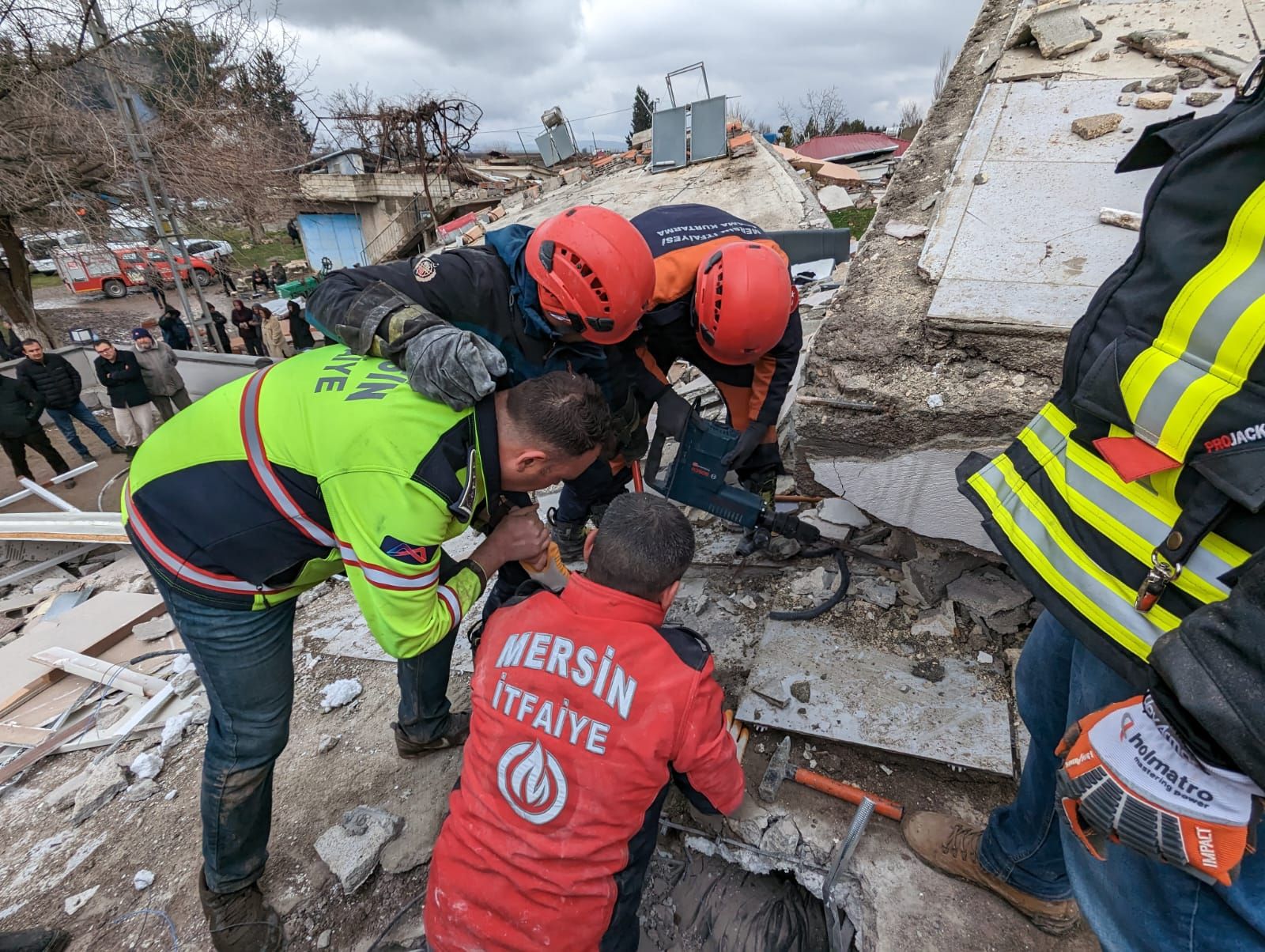
Municipal workers — the enduring backbone of social life and of the daily functioning of communities — were the first to respond to the devastating earthquake. From the very first hours of the disaster, municipal and local public service workers – many members of the General Services Workers Union of Turkey - DİSK/GENEL-İŞ - were on the ground, clearing debris, restoring essential services, and supporting emergency operations, often while personally affected by the devastation. They identified urgent needs and coordinated the delivery of food, clothing, and hygiene items to thousands of survivors. Hundreds of municipal workers from Mersin, Adiyaman, Samandag, Golbasi, and from dozens of other cities joined the response. They cleared streets, removed debris, disinfected public areas, rebuilt water and sewage systems, and delivered essential supplies. DİSK/GENEL-İŞ members took part in rescue operations, food distribution, shelter installation, and ensured continued maintenance work.
The union worked closely with communities and local governments to deliver critical assistance. It opened its guesthouse in Ankara to accommodate displaced families, offering a safe refuge amid harsh winter conditions. From every corner of Turkey, DİSK/GENEL-İŞ members in local government services converged to the affected provinces under the call from the union, “This is the time for solidarity."
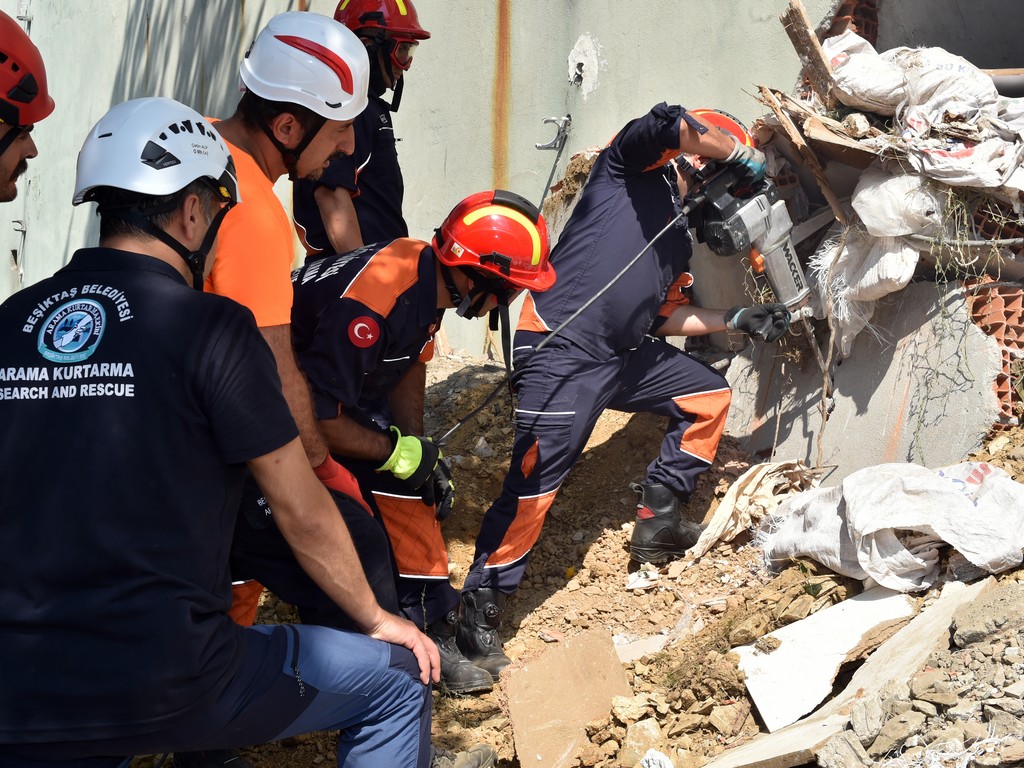
“Effective disaster preparedness and response not only depends on effective emergency systems, but also on the presence of skilled, adequately staffed, and unionised public services workers. Indeed, resilient cities are built on strong public services and on workers who are respected, protected, and empowered to serve their communities. Decent work, secure employment, and fair wages are not just labour rights; they are the foundation of resilient, equitable, and prepared societies” says DİSK/GENEL-İŞ President Remzi Caliskan. “Our trade union experience in municipal services through the February 2023 earthquake highlighted a fundamental truth: that is ‘organising saves lives’. The ability to respond rapidly, coordinate effectively, and deliver vital services in the most critical hours was possible because our union maintained strong communication connecting our members in different municipal service branches nationwide with those in the disaster zone. In such a dark hour our union mobilised our collective strength out of solidarity and ensured that help reached those who needed it most”.
PES workers in Honduras: facing wildfires and heavy winds debris with courage but inadequate Personal Protective Equipment (PPE)
Due to its geographical location Honduras is particularly exposed and vulnerable to the impacts of climate change.
The Union of Employees and Workers of the Municipality of San Pedro Sula (SIDEYTMS) of Honduras has always recognised the valuable work carried out by each of the municipal workers’ professions, especially in times of public emergencies when the Municipal Emergency Committee (CODEM) is activated.
One of the longstanding demands of SIDEYTMS to public authorities is that they provide PES workers on the front line of crises and disasters, risking their lives and endangering their physical integrity, with personal protective equipment (PPE) of adequate quality suited to their specific duties. Because of the union demands, the PPE of firefighting personnel has recently been improved with fire-resistant shirts, that can protect workers from burns when directly exposed to fires or high temperatures. Masks with smoke and ash filters, helmets, and goggles were provided. However, too often, workers have to rely on private donations by private companies rather than from their public local or national government employer.
This is not just a labour issue — it is a matter of public safety and environmental protection. Many SIDEYTMS members are responsible for safeguarding El Merendón Natural Reserve, a vital forest and watershed that provides the city of San Pedro Sula with its water supply. Without proper equipment, PES and municipal workers cannot safely perform these essential duties, putting both their lives and the communities they serve at risk. Public employers must ensure that all PES and municipal workers are fully equipped, protected, trained and empowered to carry out their essential work.
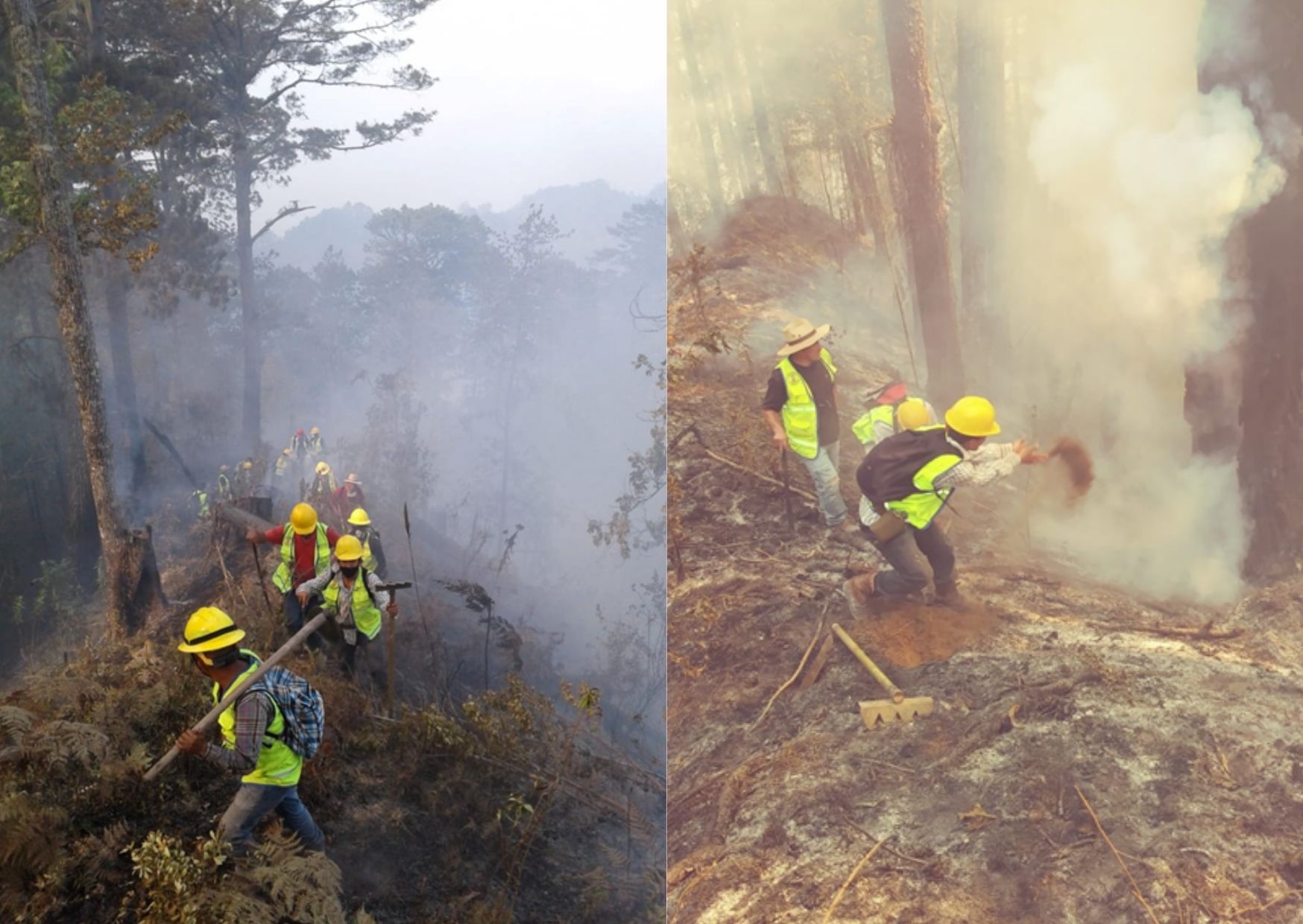
Similarly, the Environmental Management Department of San Pedro Sula also includes tree cutting and pruning crews, who respond to any emergency involving fallen trees or any disaster caused by rain and strong winds. The personnel go out to assist citizens and clear the streets of obstacles, 24/7. PES jobs often have no set schedule, as emergencies do not give advance warning.

Likewise, the Municipal Police serve the population by providing first-hand assistance and attention to citizens. They maintain order and provide security and guidance to residents on the streets. The Health Department is also active in any emergency with ambulance service, brigades, or vaccination campaigns in the event of dengue or other diseases. “We must always remember that these workers were on the front line during the COVID pandemic for three years, caring for others and putting their own health at risk”, the SIDEYTMS says. As their representative trade union, we campaign relentlessly to ensure that they are carried out in accordance with the best working conditions, that they have their protective equipment, and that they are given the corresponding rest periods or overtime pay. “We are currently requesting the reactivation of the joint health and safety committee so that we can take immediate action in response to any risks to workers This is also to bring compliance with our Collective Agreement”
Environmental workers in Argentina: essential for safe waste management during floods, yet facing daunting biological risks
On 7 March 2025, the city of Bahía Blanca (Argentina) suffered an unprecedented flash flood, leaving a devastating toll in human, material and social terms. In a single day, 290 millimetres of rain fell, a historic record for the region in the month of March, far exceeding the city's drainage capacity and collapsing its essential infrastructure. The overflowing of the Napostá stream and the Maldonado canal flooded large areas of the city, leaving entire neighbourhoods under water with large volumes of contaminated materials and urban waste. The disaster left a tragic toll of 18 fatalities, including children and elderly people, hundreds of people injured and contaminated, thousands evacuated, and structural damage that will require costly and lengthy reconstruction. Thousands of people saw their homes destroyed and their possessions swept away. The city was submerged in water, with entire areas impassable and services collapsed. The flooding highlighted a major structural problem: the lack of preparedness of Argentine cities to adapt to the climate crisis. It also highlighted the fundamental importance of good waste management before and after emergencies for public health and environmental protection, a key role played by waste collection and management workers and environmental workers.
Faced with the emergency and the lack of preparedness of the authorities and emergency services, the provincial government asked waste collection and environmental workers from the Buenos Aires Metropolitan Area Ecological Coordination Society (CEAMSE), represented by the Trade Union Association of Workers and Employees in Environmental Conservation and Special Services (AGOEC), to travel 800 kilometres to Bahía Blanca to provide relief. In addition, the union mobilised immediately, encouraged by solidarity, and called on its volunteers to assist the victims with goods and food.
Watch the video below.
CEAMSE and AGOEC workers and volunteers providing decontamination and post-flood waste management services in Bahía Blanca following the floods of March 2025. Video: AGOEC
A post-flood context poses immense biological risks to the population and the environment. In these circumstances, there is contamination from household and industrial waste, decomposing organic matter, wastewater and chemicals, creating an environment conducive to the growth of pathogenic microorganisms and extremely high risks of pandemics and public health challenges. Workers involved in cleaning and waste collection were exposed to bacteria (E. coli, salmonella, leptospirosis, tetanus), viruses (hepatitis A, norovirus, rotavirus), fungi and spores (which can cause lung infections) and parasites present in contaminated water (Giardia, Cryptosporidium), as well as biological vectors (rodents, mosquitoes). These microorganisms can enter the body through contact with broken skin, mucous membranes, inhalation or accidental ingestion. Such risks can cause skin, gastrointestinal and respiratory infections.
Protecting those who clean and rebuild cities is not only an obligation under international labour law, but an essential health and resilience strategy in the face of disasters.
However, workers were sent to emergency areas with significant deficiencies in safety measures and the availability of adequate Personal Protective Equipment (PPE). Despite the widespread use of gloves and boots, and the presence of reflective vests, most gloves did not meet biosafety standards (EN 374 or ASTM D6319), as they were predominantly made of fabric or leather, which are permeable and not resistant to biological agents, and the boots were not waterproof with non-slip soles. The absence of adequate PPE jeopardises not only the health of those performing these tasks, but also the ability to respond effectively to future emergencies.
"Post-flood waste management is a high-risk activity. To protect the health of workers, it is essential to reinforce the use of adequate PPE, improve biosafety training and ensure preventive vaccinations. Protecting those who clean and rebuild cities is not only an obligation under international labour law, but also an essential health and resilience strategy in the face of disasters.‘ said Gerardo Gabriel Juara, AGOEC Secretary of the Environment. ’In these situations, sustained investment in preventive equipment, training and planning must be structured as central components of the recovery strategy. The experience in Bahía Blanca shows the urgency of structured planning for the health response to these extreme weather events, which are becoming increasingly frequent due to climate change. At AGOEC, we have analysed this tragic experience in detail in order to learn from it and have developed a protocol for future occurrences".
PES workers in Chad: reacting to chronic urban vulnerabilities to climate change with little means but lots of courage
Chad is highly vulnerable to climate change, and its adaptation capacity - in terms of infrastructure, planning, early warning - is limited. N’Djamena, the capital, lies at the confluence of the Chari and the Logone rivers, whose swelling during the seasonal rains (usually May to October) and lack of embankment play a key role in the city’s flood risk. Urban development, poor drainage infrastructure, flat terrain and sandy soils contribute to runoff and exacerbate flood risk in the city.
From July 2022 onwards, Chad experienced heaviest seasonal rains in more than 30 years. The rains came earlier and in greater volume than usual, overwhelming drainage, and the rivers overflowed into urban zones. By October 2022 the floods had made hundreds of victims and affected more than 1 million people across many cities, towns and provinces, including N’Djamena.
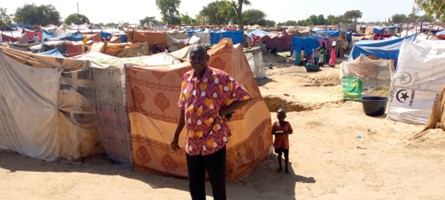
The municipality was at the forefront of efforts to help and support the displaced. It setup makeshift dwellings, generally sheds built using rudimentary materials such as straw, old blankets and breeze blocks. The Mayor intervened ordering the fire brigade to provide drinkable water and the hygiene and sanitation service to spray the dwellings to disinfect them against germs, insects and mosquitoes. The city also provided security through a detachment of the local police and the gendarmerie. These public emergency officers workers remained stationed at the various sites to assist the flood victims. It took months before these people were able to return to their homes.
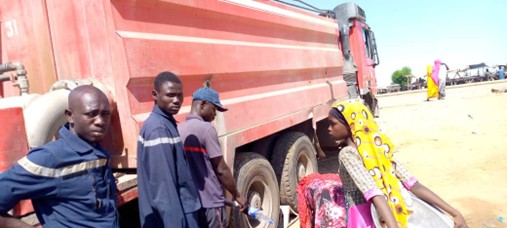
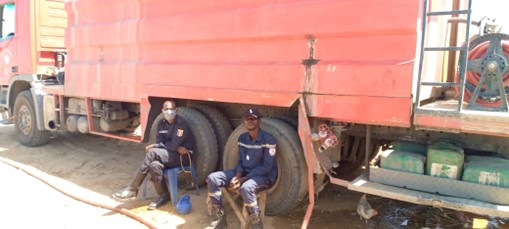
“The challenges posed by climate change in Chad are enormous and PES work in extremely difficult conditions, without personal or even collective protective equipment. Shifts are often irregular, and it can take days for these workers to get time off to visit their families and rest for at least 24 hours. They are prone to fatigue due to lack of rest. They do not receive bonuses” says Adoum Hadji Tchere, General Secretary of the National Union of Local Government Employees of Chad (SYNACOT). “I call on the Government of Chad and on the Municipality of N’Djamena to take responsibility and increase staffing levels in these vital services to deal with these now regularly recurring disasters. There is a staffing problem that prevents workers from getting regular rest and enjoy basic occupational health and safety while they perform their work duties"
Emergency workers in Spain: facing flash floods and wildfires without adequate staffing levels, and resources, with precarious working conditions
For more than a decade now, climate change has been hitting Spain hard with extreme weather events of two kinds. On the one hand, sudden and massive floods called DANAs (Isolated High-Level Depressions), which are intense meteorological phenomena that generate cold air at high altitudes that becomes ‘isolated’ and causes very heavy rain, hail, thunderstorms, runoff, flash floods and, in some cases, the collapse of infrastructure due to the volume of water and waterspouts. On the other hand, wild forest fires that can turn into avalanches of fire that spread furiously and unpredictably due to sudden changes in wind direction and unpredictable perimeters.
Between July and August 2021, the autonomous communities of Castile and León, Galicia and Extremadura were devastated by wild forest fires. In the mountains of Galicia, the pastures and hills of Extremadura, and the wooded and rural areas of Castile and León, the flames not only advanced but became an avalanche and killed eight people .
On 29 October 2024, a cold drop hit the province of Valencia and its surroundings, causing torrential rainfall and massive flooding, killing 224 people and causing serious material damage. When the DANA arrived, the emergency teams—firefighters, mobile health workers, Civil Protection, forest brigades and the numerous volunteers who came to help—were faced with an unexpected and gigantic scenario.
In a video testimony for UGT Public Services, Helios Martín, a representative of the firefighters who responded to the Valencia DANA disaster said: "We realised that all the needs we had been reclaiming for some time for our service, such as training, more tools and transport vehicles, were proven exactly right (...). With the DANA, we wanted to do more than our tools and means of transport allowed us to do. The flood flushed away entire fire trucks. We suffered from a lack of equipment. And when something like this happens and there are no replacement vehicles, you can't respond to the emergency. (...) Confronting the DANA, we worked with shared (not individual) PPE, which got wet, and we did not decontaminate. At the workplace, we need much more if we are to provide the services that citizens deserve”.
Video testimonials from representatives of firefighters, forest brigades, local police and other workers who provided emergency services after the DANA in Valencia on 29 October 2024. Source: UGT Public Services
In each response, emergency workers were not only carrying out technical work but also bearing an immense psychosocial and emotional burden, both individually and collectively: protecting lives, property, landscapes, heritage, nature, biodiversity and memories of their places of life.
The UGT Public Services union has been demanding urgent and immediate action from the government and the European Union for years to improve the prevention of fires and DANAs, denouncing the precariousness, deterioration of working conditions and cuts in the autonomous communities that are getting worse among forest firefighters, as well as among the forest and environmental agents. For example, a year before the Valencia floods, the regional government closed the local emergency coordination unit (UVE) due to budget cuts. The union is calling for the development of regional legislation that establishes, in addition to a common framework for greater efficiency and coordination of the services and resources that guarantee environmental and public safety, an improvement in the professional and legal framework for emergency service workers, defining clear and updated functions; up-to-date and ongoing training, as well as the dignification of the sectors through the negotiation of collective agreements.
On this UN World Cities Day 2025, PSI celebrates the unwavering dedication of public emergency workers who keep our cities safe, resilient, and humane. Their labour is the backbone of urban life, yet too often understaffed, undervalued, underpaid, and under-protected. As governments and UN agencies reflect on this year’s theme of "people-centred smart cities", we must recognise that no city can be sustainable without investing in the dignity, decent work, human and labour rights of those who protect it. Empowering PES workers is not only an international human and labour right obligation — it is essential public policy for equity, resilience, and justice in every city worldwide.
Download our posters
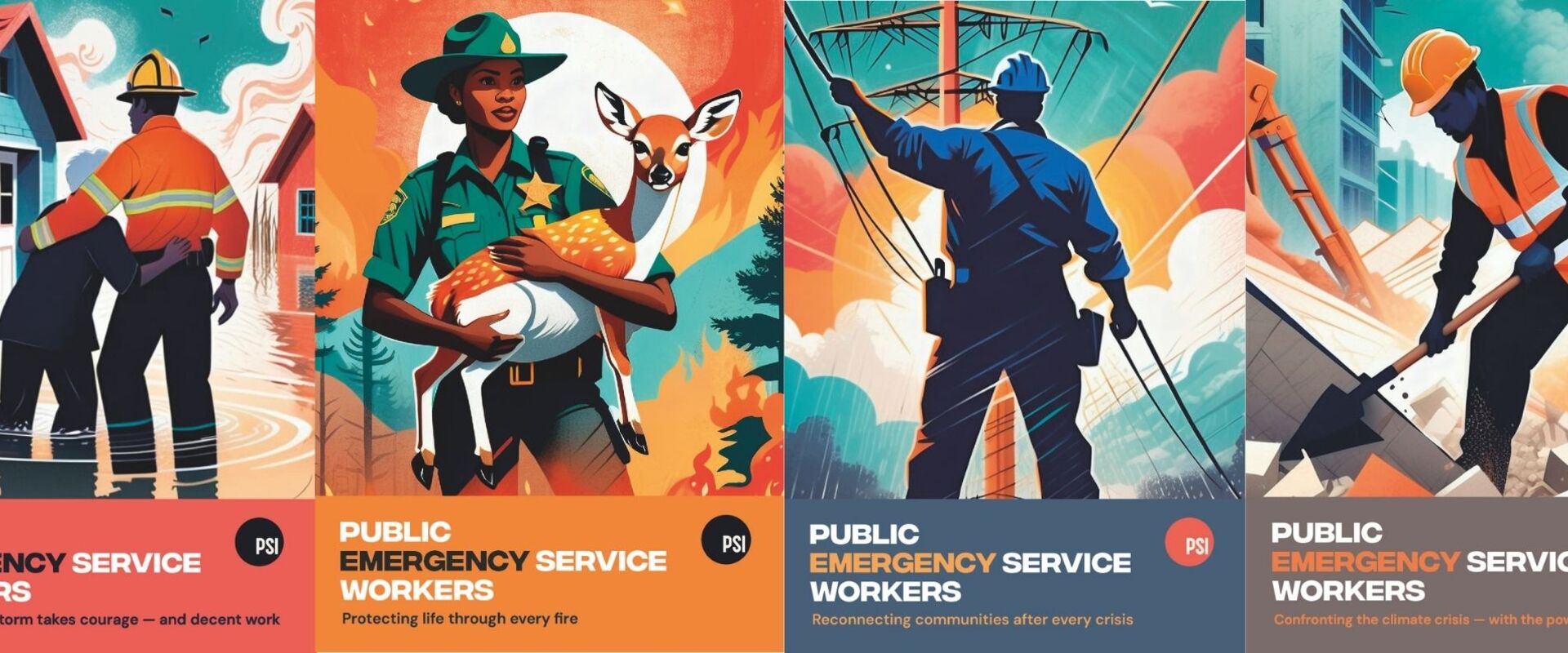
Local & Regional Government Workers Portraits
Over the years, PSI has produced a series of posters, in several languages, representing LRG workers at work. Feel free to download and use them!
Click here